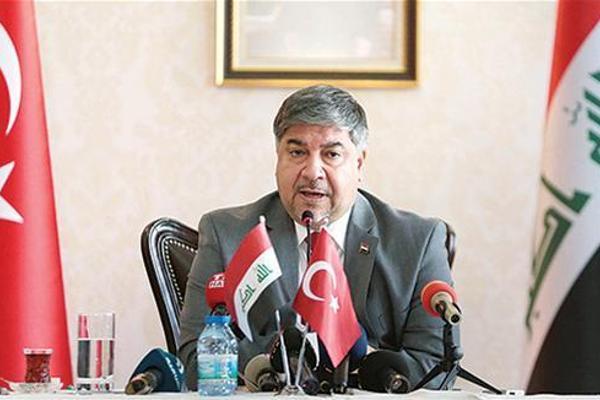Turkish troops to retreat at end of Mosul offensive but camp should be Iraqi: Ambassador
Sevil Erkuş - ANKARA


“Both prime ministers have agreed on the key issue of resolving this issue as soon as possible. The two sides have agreed to implement the process of withdrawal of those forces after the end of the military operation to liberate Mosul. We expect that to happen soon. Our prime minister said he expects to finish the Nineveh operation within three months,” al-Allawi told a group of journalists on Jan. 11 in the wake of Prime Minister Binali Yıldırım’s visit to Baghdad and northern Iraq over the weekend.
In terms of the details of the process, both parties have agreed on upcoming meetings between the relevant institutions in order to agree on details of withdrawal, he added.
However, Iraq is insistent that the camp should run under the authority of the Iraqi government until the withdrawal, rejecting a proposal by Ankara to operate the camp as a coalition base.
“Iraq has made it clear that the Bashiqa camp is an Iraqi camp and it has to be run by Iraqi authorities. We expect to hear form Turkish authorities regarding the details of this process as soon as possible. Prime Minister Yıldırım told our prime minister that he will brief President [Recep Tayyip] Erdoğan and he will report to us as soon as possible,” the ambassador stated.
Turkey will discuss the presence of Turkish troops at Bashiqa with Baghdad after the area is cleared of the Islamic State of Iraq and the Levant (ISIL), Turkish Defense Minister Fikri Işık said Jan. 11, adding that the matter would be resolved in a friendly manner.
“Turkey respects Iraq’s territorial integrity and unity, and the presence of our troops in Bashiqa is not a choice but a necessity,” Işık said.
First resolve Bashiqa problem, then move on cooperation
Al-Allawi is optimistic about a wide range of cooperation opportunities, but stresses that the parties should resolve the Bashiqa camp problem in order to make progress on other areas.
“Turkey has expressed its interest to support us [on] counter terrorism. There is an interest to provide trainers or advisers, equipment, logistical support, military medical aid, humanitarian aid and reconstruction of cities destroyed by DAESH [ISIL],” al-Allawi said. “If we manage to successfully resolve the Bashiqa camp issue, all the above could be discussed and agree upon through meetings of the relevant authorities.”
‘We want clarification for Bashiqa visit’
A visit by Işık, Health Minister Recep Akdağ and Energy Minister Berat Albayrak to Bashiqa to meet Turkish troops and their commanders over the weekend, one day after Yıldırım’s talks in Baghdad, upset the Iraqi government, the envoy said.
The visit to Bashiqa camp by the ministers was not part of the program, and the Iraqi government was surprised when they heard about the visit, he said.
Ankara justified the visit, saying that while Yıldırım was in Arbil, he and Kurdish northern Iraqi leader Massoud Barzani visited Peshmerga troops on the border between Arbil and Mosul and that Yıldırım received phone calls from Turkish officers and soldiers in the camp who asked him to visit the camp, the ambassador said.
“We really did not think that it was wise to do so without consultation with the Iraqi government given the sensitivity of the issue. It was not part of the program. If it has happened in the way it has been referred to, then it was also not wise to publicize the visit. We are waiting to see further clarification from [Turkish] authorities,” the envoy stated.
“Our government would not object if the reason for the visit had been for what we agreed upon. We don’t have a problem with the relevant minister visiting the camp and telling the officers and soldiers that ‘we had an agreement with the central government, and we are preparing for the withdrawal of forces from the camp shortly after the end of the Mosul operation,’” al-Allawi stated.
‘We’ll continue to give salaries to groups in Sinjar’
Touching on Turkey’s demand that Iraq cut off financial support to local groups in the Sinjar region which Ankara claims are affiliated with the PKK, the ambassador said he had not seen “any credible evidence” to accept that they had relations with the PKK and that Baghdad would continue to support them.
“The government has been supporting Iraqis who are part of the Yazidi community in Sinjar. They have come together and have been working together with the Popular Mobilization Units [al-Hashd al-Shaabi] to fight DAESH and control the city,” he said, adding that Baghdad had a responsibility to provide them military equipment, enable them to defend their area and provide them with salaries.
“We have not provided financial support to members of the PKK, but we have supported our local citizens,” he added.
Baghdad has pledged to defeat all “foreign troops” in Sinjar, whether they are PKK or ISIL, the envoy said.
“There is an agreement between the central government and the Kurdistan Regional Government to liberate Sinjar jointly and to run the military operations and maintain peace and stability in the area jointly after that,” the ambassador said, but he ruled out any possible Turkish military incursion into Sinjar to remove the PKK.
“We are committed to addressing the concerns Turkey has when it comes to the PKK presence in northern Iraq,” he said. “[But] Iraqi authorities would not expect Turkish authorities to conduct any military operations on Iraqi territory.”
